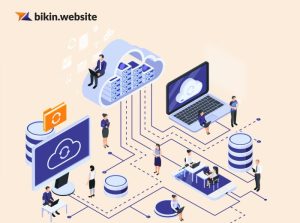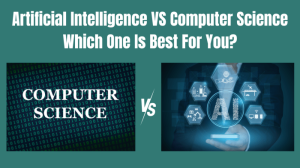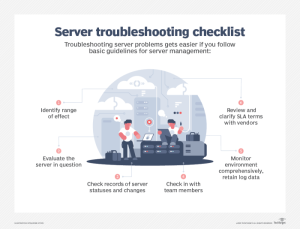
Embark on a journey through the world of Artificial Intelligence in computer technology, where innovation knows no bounds and possibilities are endless.
From optimizing mobile devices to enhancing computer security, AI is reshaping the tech landscape in remarkable ways.
Artificial Intelligence in Computer Technology
Artificial intelligence (AI) in computer technology refers to the simulation of human intelligence processes by machines, specifically computer systems. This includes learning, reasoning, problem-solving, perception, and language understanding.
Role of Artificial Intelligence in Advancing Computer Technology
Artificial intelligence plays a crucial role in advancing computer technology by enabling machines to perform tasks that typically require human intelligence. This includes automation, data analysis, pattern recognition, and decision-making.
- AI algorithms are used in data analytics to process large volumes of data quickly and efficiently, providing valuable insights for businesses and organizations.
- Machine learning, a subset of AI, allows computers to learn from data and improve their performance over time without explicit programming.
- Natural language processing (NLP) enables computers to understand and generate human language, facilitating communication between humans and machines.
- Computer vision, another application of AI, allows machines to interpret and analyze visual information from the environment, enabling tasks like facial recognition and object detection.
Mobile Computing

Artificial intelligence has revolutionized mobile computing by enabling smarter, more efficient devices that cater to the needs of users in a personalized way.
Impact of AI on Mobile Computing
AI has significantly impacted mobile computing by enhancing the overall user experience through various ways.
- Personalized Recommendations: AI algorithms analyze user data to provide personalized recommendations for apps, content, and services, making the mobile experience more tailored to individual preferences.
- Voice Assistants: Virtual assistants powered by AI, such as Siri and Google Assistant, enable hands-free interaction with mobile devices, offering convenience and efficiency.
- Enhanced Security: AI-driven security features like facial recognition and behavioral biometrics enhance the security of mobile devices, protecting user data from unauthorized access.
Role of AI in Optimizing Mobile Device Performance
AI plays a crucial role in optimizing mobile device performance by utilizing machine learning algorithms to enhance speed, battery life, and overall efficiency.
AI algorithms can predict user behavior and optimize device settings in real-time to ensure smooth performance and efficient resource utilization.
- Performance Optimization: AI algorithms monitor device usage patterns and adjust settings to improve performance and responsiveness, providing a seamless user experience.
- Battery Management: AI helps in optimizing battery usage by intelligently managing power consumption based on usage patterns, extending the device’s battery life.
- Resource Allocation: AI algorithms allocate resources efficiently, prioritizing tasks based on user preferences and usage history to enhance overall device performance.
Computer Security

Artificial intelligence plays a crucial role in enhancing computer security measures by utilizing advanced algorithms to detect and prevent cyber threats effectively.
AI-Powered Security Solutions
- AI-based Intrusion Detection Systems (IDS): These systems use machine learning algorithms to analyze network traffic patterns and identify suspicious activities that may indicate a potential cyber attack.
- Behavioral Analysis Tools: AI-powered tools can monitor user behavior and detect anomalies that deviate from normal patterns, helping to prevent insider threats and unauthorized access.
- Malware Detection and Prevention: AI algorithms can scan and analyze files in real-time to identify and block malicious software before it can infect a system.
- Predictive Threat Intelligence: AI technology can analyze vast amounts of data to predict and proactively defend against emerging cyber threats before they cause harm.
- Automated Incident Response: AI-driven systems can automate the response to security incidents, enabling faster detection, containment, and mitigation of cyber attacks.
Computer Software
Artificial intelligence is revolutionizing computer software development by enabling developers to create more intelligent and adaptive applications. AI-powered software utilizes machine learning algorithms to analyze data, learn patterns, and make decisions without explicit programming.
AI-Powered Software Applications
AI-powered software is being used across various industries for a wide range of applications. For example, in healthcare, AI algorithms are being used to analyze medical images, predict patient outcomes, and assist in diagnostics. In finance, AI-powered software is used for fraud detection, algorithmic trading, and personalized financial recommendations.
- AI-powered chatbots are transforming customer service by providing instant responses and personalized interactions.
- AI-driven virtual assistants like Siri and Alexa are revolutionizing how we interact with technology.
- AI-powered recommendation systems are enhancing user experience by providing personalized content and product suggestions.
Benefits of AI in Software Development
Using AI in software development offers numerous benefits, including increased efficiency, enhanced user experience, and the ability to automate repetitive tasks. By leveraging AI algorithms, developers can streamline the development process, identify bugs and errors more quickly, and create more innovative and intelligent software solutions.
AI-powered software can adapt to user behavior and preferences, providing a personalized experience that improves over time.
By analyzing vast amounts of data, AI algorithms can identify trends and patterns that humans may not be able to detect, leading to more accurate and insightful software solutions.
Computer Systems
Artificial intelligence is reshaping the landscape of computer systems architecture, bringing about significant advancements in performance, efficiency, and overall capabilities. By integrating AI technologies into computer systems, we are witnessing a profound transformation in how these systems operate and interact with users.
Revolutionizing Computer Systems Architecture
- AI-driven algorithms are optimizing the design and layout of computer systems, enhancing their processing speed and overall performance.
- Machine learning models are being used to analyze and predict system behavior, allowing for proactive maintenance and troubleshooting.
- AI-based automation is streamlining system management tasks, reducing human intervention and potential errors.
Optimizing Performance and Efficiency
- AI algorithms are continuously monitoring system operations, identifying bottlenecks, and optimizing resource utilization for enhanced efficiency.
- Deep learning techniques are improving system response times and throughput, leading to faster and more reliable computing experiences.
- AI-powered predictive analytics are forecasting system demands and adapting configurations in real-time to meet changing requirements.
Future Developments in AI-Driven Computer Systems
- Advancements in neural network architectures are enabling more complex decision-making processes within computer systems, mimicking human cognitive functions.
- AI systems are evolving to self-optimize and self-heal, anticipating and resolving issues before they impact system performance.
- The integration of AI with quantum computing is opening up new frontiers in computing power and capabilities, revolutionizing the way we approach complex computational problems.
Computer Technology
Artificial Intelligence (AI) is revolutionizing the field of computer technology, paving the way for exciting advancements and innovative applications. AI algorithms and machine learning techniques are constantly evolving, enabling computers to perform complex tasks with remarkable efficiency and accuracy.
Latest Trends and Advancements in AI within Computer Technology
- One of the latest trends in AI within computer technology is the rise of deep learning algorithms, which mimic the way the human brain processes information.
- Natural Language Processing (NLP) has seen significant advancements, allowing computers to understand and generate human language.
- AI-powered autonomous systems, such as self-driving cars and drones, are becoming more sophisticated and reliable.
- AI is being increasingly used in cybersecurity to detect and prevent cyber threats in real-time.
How AI is Shaping the Future of Computer Technology
- AI is driving the development of more intelligent and intuitive user interfaces, making interactions with computers more natural and seamless.
- Automation of repetitive tasks through AI is increasing productivity and efficiency in various industries.
- AI is enabling the creation of personalized and targeted content, products, and services based on user preferences and behavior.
- The integration of AI in computer technology is leading to the emergence of smart cities, smart homes, and connected devices that enhance our daily lives.
Integration of AI in Various Computer Technology Domains
- In healthcare, AI is being used to analyze medical images, diagnose diseases, and personalize treatment plans for patients.
- In finance, AI-powered algorithms are used for fraud detection, risk assessment, and automated trading.
- In education, AI is transforming the way students learn through personalized tutoring systems and adaptive learning platforms.
- In manufacturing, AI is optimizing production processes, predicting maintenance needs, and improving supply chain management.
Computer Gadgets
Artificial intelligence has revolutionized the world of computer gadgets, bringing about a new level of functionality and convenience. These AI-powered features have enhanced the user experience and performance of various computer gadgets, making them more intuitive and efficient.
Impact of AI on Computer Gadgets
- AI algorithms in smart speakers like Amazon Echo and Google Home enable voice recognition and natural language processing, allowing users to control devices through voice commands.
- Smartphones with AI capabilities, such as the iPhone’s Siri and Samsung’s Bixby, provide personalized recommendations, language translation, and photo enhancement.
- AI-powered wearables like smartwatches and fitness trackers track health metrics, analyze data, and provide real-time feedback to users for improved health and fitness monitoring.
Examples of Computer Gadgets with AI Technology
- Roomba vacuum cleaners use AI to navigate and clean floors efficiently without human intervention, adapting to different surfaces and obstacles.
- Drones equipped with AI technology can autonomously fly, capture images, and avoid obstacles, making them ideal for aerial photography and surveillance.
- AI-powered cameras like the Sony Aibo use facial recognition to identify pets and people, capturing memorable moments with precision and clarity.
Final Conclusion
As we wrap up our exploration of AI in computer technology, it’s clear that the future is bright with endless opportunities for growth and advancement in this exciting field.
Expert Answers
How is AI transforming computer systems architecture?
AI is revolutionizing computer systems by optimizing performance, enhancing efficiency, and paving the way for future developments in AI-driven systems.
What are some popular computer gadgets that utilize AI?
Popular computer gadgets like smart speakers, smartphones, and autonomous vehicles leverage AI-powered features to enhance functionality and user experience.






